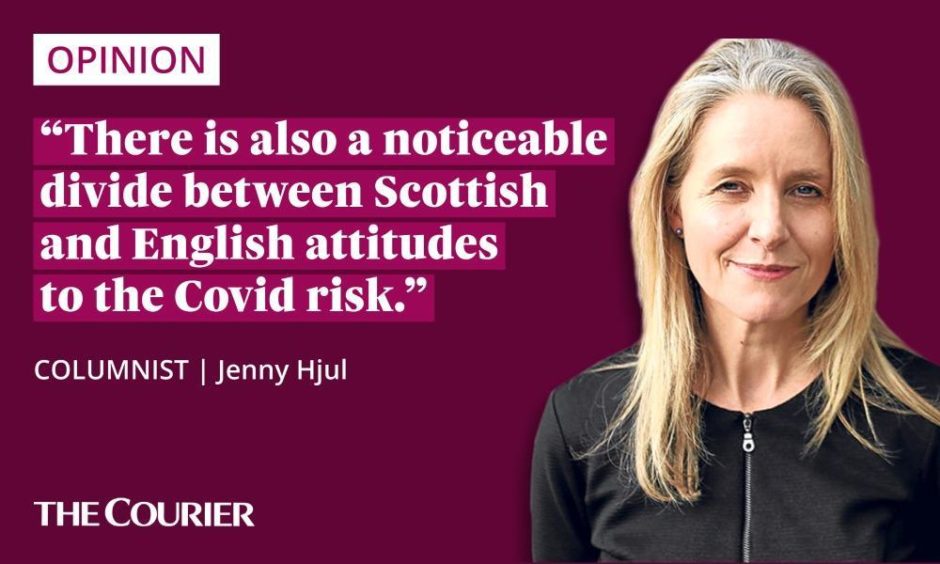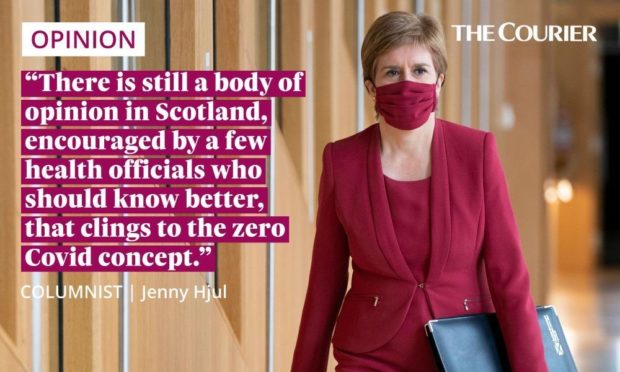There is a tendency to blame the current surge in Scotland’s Covid rates on the earlier return of schools here than in England.
But this misses two points.
One is that while the school holidays may not have ended quite yet south of the border, the restrictions did, weeks before Scotland’s pandemic curbs were eased.
People there have been crowding into pubs and on to public transport since mid-July, when all venues, including theatres, sports stadiums and night clubs, were allowed to operate at full capacity, and the legal requirement to wear masks was removed.
Here, we have been far more cautious, and when the measures were at last lifted, on August 9, Scots were warned by Deputy First Minister John Swinney that face coverings were likely to remain a ‘significant’ part of life.

Scottish schoolchildren are spending all day in masks, as are their teachers, and they are still being sent home in droves.
This is despite promises from the government that self-isolation would be reviewed so classrooms could stay open.
There is also a noticeable divide between Scottish and English attitudes to the Covid risk, with decisions on what controls to keep in place often left to the discretion of individual businesses.
This has resulted in some Scottish publicans opting to ban “vertical drinking” at the bar and some shopkeepers closing their changing rooms, while neighbouring establishments impose different regulations.
Schools scapegoated for Covid rates rise
Despite this reluctance to embrace “freedom”, Scotland now tops the European league of Covid hotspots, with Lanarkshire and Greater Glasgow, in particular, seeing surges.
The other reason that schools are an implausible scapegoat is because of what happened almost two months ago.
In early July, the headlines were similar to today’s, with Scotland dubbed “the coronavirus capital of Europe”.
One analysis then, published in the Daily Telegraph, suggested a combination of reasons, including a slower rollout of second vaccine doses, lower levels of antibodies in the population (due to lower community transmission in the first wave), and the failure to contain the initial outbreak of the Delta variant in Glasgow.
Scottish schoolchildren were already on holiday then and so the Euros were cited as the Covid super spreader, with travelling football fans creating a mini “sombrero”, as Boris Johnson might say.
Back then it was Dundee and Aberdeen bearing the brunt, with the most clinically vulnerable and the most deprived hit hardest.
“This is all about inequality,” Professor Linda Bauld, public health professor at the University of Edinburgh, said at the time.
Now she is advising Scotland to keep calm in the face of the latest rise in positive cases, and it is this wise counsel Nicola Sturgeon should heed, not entreaties from the panic merchants to lock down, Antipodes style.
As Bauld said this week, people were told that vaccines offered them an escape from where we were in 2020, and now that Scotland has more than 90% of over-16s with a first dose, and 80% with a second dose, shutting things down again would be “difficult”.
“Things would need to get a lot worse in terms of hospital capacity for that to occur and I don’t see that on the immediate horizon,” says Bauld.
‘Perfect storm’ talk isn’t helping
There is still a body of opinion in Scotland, encouraged by a few health officials who should know better, that clings to the zero Covid concept, spectacularly discredited by the events unfolding in Australia and New Zealand.
The notion that Scotland could have eradicated the virus if it had completely closed its borders is surely now seen for the nonsense it is as Covid becomes increasingly endemic across the globe.
And yet the sense in England that repeat lockdowns are over has yet to be fully accepted in Scotland, with the Health Secretary Humza Yousaf’s talk of a “perfect storm” doing little to soothe the jittery.
Sturgeon said she is not currently considering a circuit breaker, the ominous temporary (but not really) shutdown that would set us back to the dark days of winter.
“None of us want to go backwards to even limited restrictions,” she said last Friday, to the relief of those of us, hopefully the majority, who do not relish forfeiting our liberties once more.
She urged people to do their part in limiting the spread of the virus but such vagueness, reinforced with the threatened re-imposition of formal restrictions, will only serve to foster fears in Scotland.
Meanwhile, the Scottish government is seeking to make its emergency coronavirus powers permanent, which would mean rule by authoritarian diktat forever.
Of more immediate worry, Scotland’s national clinical director, Jason Leitch, suggested on Monday that “some bits of society” may have to be turned off to combat rising infections.
What bits and why, when – as Professor Bauld made clear – vaccinations have provided our route out of the crisis stage of Covid?
